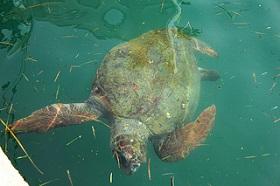Using AI to control energy for indoor agriculture
30 September 2024
Published online 17 December 2013

Endangered marine turtles captured as by-catch in the Mediterranean Sea often die months after they are released by fishermen, according to a new study.
Turtles have inhabited the world's oceans for more than 100 million years, and of the seven species that still exist, three are found in the Mediterranean: the green turtle (Chelonia mydas), the leatherback turtle (Dermochelys coriacea) and the loggerhead turtle (Caretta caretta).
They are all classified as endangered on the IUCN Red List, but the researchers suggest by-catch of loggerhead turtles is leading to delayed mortality.
More than 10,000 loggerhead turtles are caught as by-catch by the Spanish longline fleet operating in the southwestern Mediterranean every year. About 40% of these die within three months of being released back into the sea, according to Lluís Cardona, member of the Research Group on Large Marine Vertebrates of the University of Barcelona and co-author of the study.
Cardona and his team fitted 26 loggerhead turtles that had been by-caught with transmitting tags and satellite-tracked them.
Bait hooks often get lodged in the jaws, mouths, esophaguses or stomachs of the loggerheads that bite them or swallow them. Instead of hauling the turtles onboard to remove the hooks and lines, the fishermen merely cut the line and release the turtles into the water.
Swallowed fishing lines go down the turtle's alimentary tract until the end comes out through the cloaca, causing it to die in the weeks or months that follow its accidental capture.
During the study, the hooks were not removed and swallowed lines were left in place to help the researchers gather more information about the probability of post-release mortality caused by longline fishing.
"Two loggerhead turtles died immediately after capture, of injuries caused by the hook," says Cardona. While the exact cause of death of the remaining turtles has not been formally identified, based on previous studies, Cardona surmises that the fishing line finally kills them.
I don’t know whether these laws truly reduced the trade or merely made traders more cautious.
The survival of loggerhead turtles is further threatened in the Eastern Mediterranean, especially in Greece, Libya and Egypt, where intentional killing is widespread.
"In Greece, fishermen blame turtles for fish scarcity, while in Egypt and Libya and more recently Tunisia, turtle meat consumption is depleting the loggerhead population," says Cardona. In Libya, eggs are picked from nests and eaten.
By-catch injuries are the leading cause of death for marine turtles near the Egyptian and Libyan coasts, but catching them for meat is also a threat, says Mohamed Nada, representative of the Mediterranean Association to Save the Sea Turtles (MEDASSET) and member of the NGO Nature Conservation Egypt.
"Ten years ago, it was normal to encounter live turtles for sale at Al-Anfoushi fish market in Alexandria," Nada says. While the meat is not sold as openly now, he warns, the turtle meat trade continues.
Since Egypt signed international biodiversity protection treaties and drafted national laws with penalties for the capture and sale of endangered species, fishermen who catch marine turtles avoid detection by coastguards by cutting up the turtles onboard and putting the meat in plastic bags, to sell or eat later.
"I don't know whether these laws truly reduced the trade or merely made traders more cautious," says Nada. Surveying fishermen across the Mediterranean coast of Egypt in 2011, he found that statistics suggest that more than 7,000 loggerhead and green turtles were captured annually in Egypt alone.
doi:10.1038/nmiddleeast.2013.243
Stay connected: